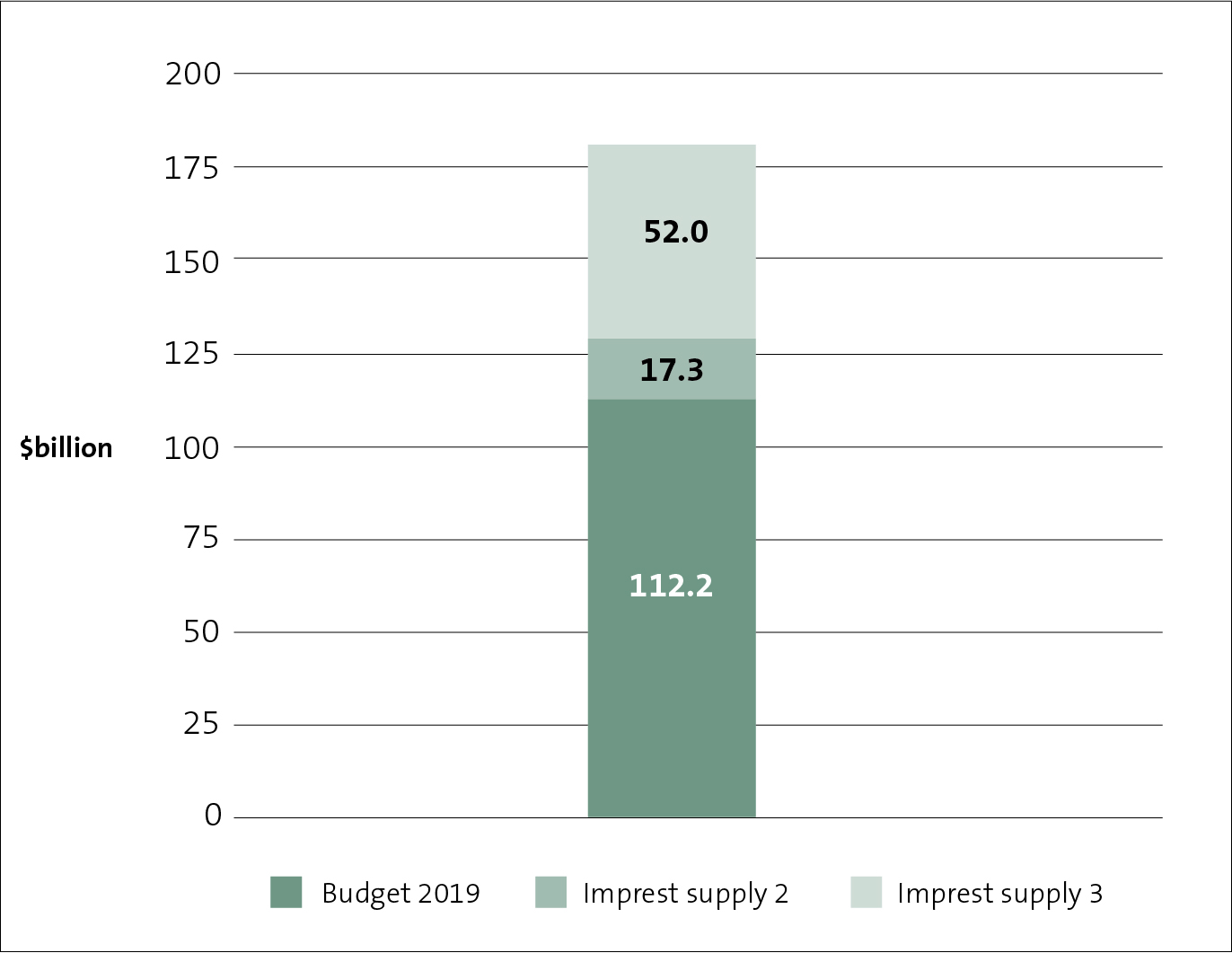Controller update on Government spending on Covid-19
Key points
- Given the scale of the Covid-19 pandemic, the substantial funding available for responding to it, the pace of the Government’s emergency response, and the extraordinary conditions under which the public sector is operating, we will be giving special attention to Covid-19 spending. In this Update, we focus on spending approved during March 2020.
- On 27 March 2020, the Government invoked emergency provisions in the Public Finance Act 1989, which allowed the Minister of Finance to approve spending without needing any further authority from Parliament. The potential use of that provision expired on 23 April 2020, without the Government needing to use it.
- On 25 March 2020, in response to the Covid-19 pandemic, Parliament passed legislation authorising the Government to spend up to $52 billion more than the $129.5 billion already authorised for 2019/20.
- During March, the Government approved additional spending of $11.5 billion to respond to Covid-19. Most – $9.3 billion – was for the Business Support Subsidy. By 31 March, less than $3.9 billion of spending related to the Subsidy had been incurred.
- We are satisfied that the additional Covid-19 spending for March has been correctly approved. So far, we have not identified any Covid-19 spending that is outside the approvals provided by Parliament or Cabinet.
Our role
Our constitutional arrangements require that the Government must not spend public money unless it is approved by Parliament.
The Controller and Auditor-General is often referred to as the public “watchdog” on government spending. An important part of the watchdog role is the Controller function. In this Controller role, we provide assurance to Parliament and New Zealanders that the Government has spent public money in line with the authority it has from Parliament.
The funding approved in the 2019/20 Budget is inadequate for the Government’s Covid-19 response. On 25 March, Parliament approved the Government to spend up to an additional $52 billion; this was mainly to enable the Government to incur expenditure on the Covid-19 measures it had announced and to cover any further measures it might consider necessary. Some of the additional funding is also needed for other activities because the Covid-19 spending that took place before 25 March reduced the amount of funding available for the normal business of the Government.
As the independent watchdog on Government expenditure, we will continue to monitor the Covid-19 spending. We will provide an overview to the public and Parliament about the spending and how departments are accounting for it.
How much can the Government spend in 2019/20?
For 2019/20, Parliament has approved the Government (and Officers of Parliament) to spend up to $181.5 billion. Figure 1 shows how various Acts of Parliament provide the authority to incur this much expenditure.
- Budget 2019: $112.2 billion in the Appropriation (2019/20 Estimates) Act 2019.
- Imprest Supply 2: $17.3 billion in the Imprest Supply (Second for 2019/20) Act 2019.1
- Imprest Supply 3: $52 billion in the Imprest Supply (Third for 2019/20) Act 2020.
Figure 1
Spending approved by Parliament for 2019/20, as at 31 March 2020

The third Imprest Supply Act was passed mainly to cover spending on the response to Covid-19. The Government tightly controls how imprest supply is used, through explicit Cabinet approval or by Cabinet delegation to joint Ministers.2
It is important to note that the total amount of money shown in Figure 1 is the maximum amount that Parliament has approved – it does not show how much the Government has actually spent, has planned to spend, or will eventually spend.
As well as the approvals shown in Figure 1, the Government, on 27 March 2020, activated section 25 of the Public Finance Act 1989 for a four-week period to 23 April 2020. This provision allows the Minister of Finance to approve spending in response to an emergency or disaster, regardless of whether there is an existing Parliamentary approval to cover that spending. The Government had no need to draw on that provision during those four weeks.
New spending approvals in March
In March 2020, the Government announced a range of initiatives as part of its Covid-19 response package. As part of our routine Controller checks, we reviewed the Government’s March financial data on departmental spending. We paid particular attention to new approvals attributed to the Covid-19 response.
The Cabinet approved $13.6 billion of additional spending under imprest supply during March. It is important to recognise that the extra spending approved is unlikely to equate to the increase in overall Government spending because, at the same time as approving new spending under imprest supply, the Government is reprioritising some of the spending previously approved. (That is, it is reducing the funding previously allocated to some areas.)
How much is for the Covid-19 response?
Of the $13.6 billion extra spending the Government approved in March, the Treasury’s records indicate that $11.5 billion relates directly to the Covid-19 response. Of the $11.5 billion, about $664 million will top up existing appropriations.3
The largest top-ups in March are for health spending ($265.2 million) and social spending ($361.3 million) such as the winter energy payment, supported living payment, sole parent support, and jobseeker support and emergency payment.
The remaining $10.8 billion applies to new spending that is not covered by existing appropriations. The allocation of the $10.8 billion is shown in Figure 2.
Figure 2
New areas of Government spending on Covid-19, as at 31 March 2020
| New initiative | Approved by Cabinet ($million) |
Expenditure incurred ($million) |
|---|---|---|
| Business Support Subsidy Covid-19 | 9,300.0 | 3,892.2 |
| Worker Redeployment Package | 100.0 | 0.04 |
| Financial Assistance to Support Worker Self-Isolation | 126.5 | 59.2 |
| Supporting Iwi Covid-19 Responses | 0.5 | 0.4 |
| Maintaining Air Freight Capacity | 330.0 | 0.7 |
| Covid-19: Capital Injection to Airways New Zealand | 70.0 | 70.0 |
| Covid-19: Loans to Air New Zealand | 900.0 | 0.0 |
| TOTAL | 10,827.0 | 4,022.5 |
Figure 2 shows that, as at 31 March, the Government had incurred over $4 billion (37%) of the $10.8 billion authorised for new Covid-19 response initatives. Spending was predominantly on the Business Support Subsidy ($3.9 billion), about 42% of the $9.3 billion authorised by Cabinet at that time.
The “expenditure incurred” figures have not been audited. We will confirm the final amounts as part of our annual audits of government departments and of the Financial Statements of the Government of New Zealand for the year ending 30 June 2020.
As part of our continuing Controller work, we will review figures from April 2020 later in May.
Has the Covid-19 spending been correctly approved?
As part of our recent Controller work on the March financial information, we reviewed all available Cabinet decisions approving new spending recorded as for Covid-19. All of the approvals were made correctly. We confirmed that the nature and purpose of the spending, as stated in the approval documents, is related to the Covid-19 response.
We also examined the approvals for topping up existing appropriations to ensure that the nature of the new spending approval aligns with the legal scope of the appropriation.
We have not identified any specific concerns about the system for approving the Covid-19 spending. We will review more Cabinet decisions after the Budget information has been published on 14 May and more again when we receive the April financial information.
Has the Covid-19 spending been correctly applied?
It is important for the Controller to determine whether there has been any spending incurred without the necessary approval. We have so far not identified any spending in response to the Covid-19 pandemic that is outside the approvals provided by Parliament or, where necessary, the subsequent Cabinet approvals to incur additional spending under imprest supply.
The Treasury expects departments to be able to monitor and report on any new funding received for Covid-19. We expect that this will present some practical difficulties in identifying and separating all Covid-19 spending from other spending , and some judgements will need to be made. As part of our annual audit work, we will take a close interest in how departments are disclosing information about their spending on Covid-19 and the effect it has had on their finances and operations.
Other Covid-19 matters
The Auditor-General’s interest in the Government’s Covid-19 response is much wider than his Controller role. We are currently preparing a programme of work that will examine aspects of the Government’s response to Covid-19. This work will seek to inform Parliament and the public about how the public sector has managed these challenges and how well it is positioned to support New Zealand to recover.
As one example, we have agreed with the Ministry of Health to provide an independent review of the Ministry’s management of personal protective equipment required for the Covid-19 response. We intend to report publicly on our findings.
We are also seeking feedback on our Draft annual plan, which we envisage will be significantly influenced by Covid-19 matters.
1: The first Imprest Supply Act for the year allows the Government to incur expenditure up until the time the Budget is passed into legislation. After that, the second and third Acts (Imprest Supply 2 and 3) allow the Government to incur expenditure in addition to that included in the original Budget for the year. This gives the Government room to respond to changes since the Budget was put together earlier in 2019.
2: For ease of reference, we refer to both Cabinet and joint Ministers’ approval as Cabinet approval. Joint Ministers approval is by Cabinet delegation and refers to a requirement to gain the approval of both the Minister of Finance and the relevant Appropriation Minister.
3: Appropriations are authorities from Parliament that specify what the Crown may incur expenditure on. Most appropriations specify limits in terms of the type of expenditure, what it can be used for, the maxiumum amount, and the time period.
4: Some of the expenditure approved under “Worker Redeployment Package” has been redirected to other, existing appropriations in line with its intended application. Hence any expenditure incurred by 31 March would be reported against those other appropriations. (See Beehive release "$100 million to redeploy workers")

